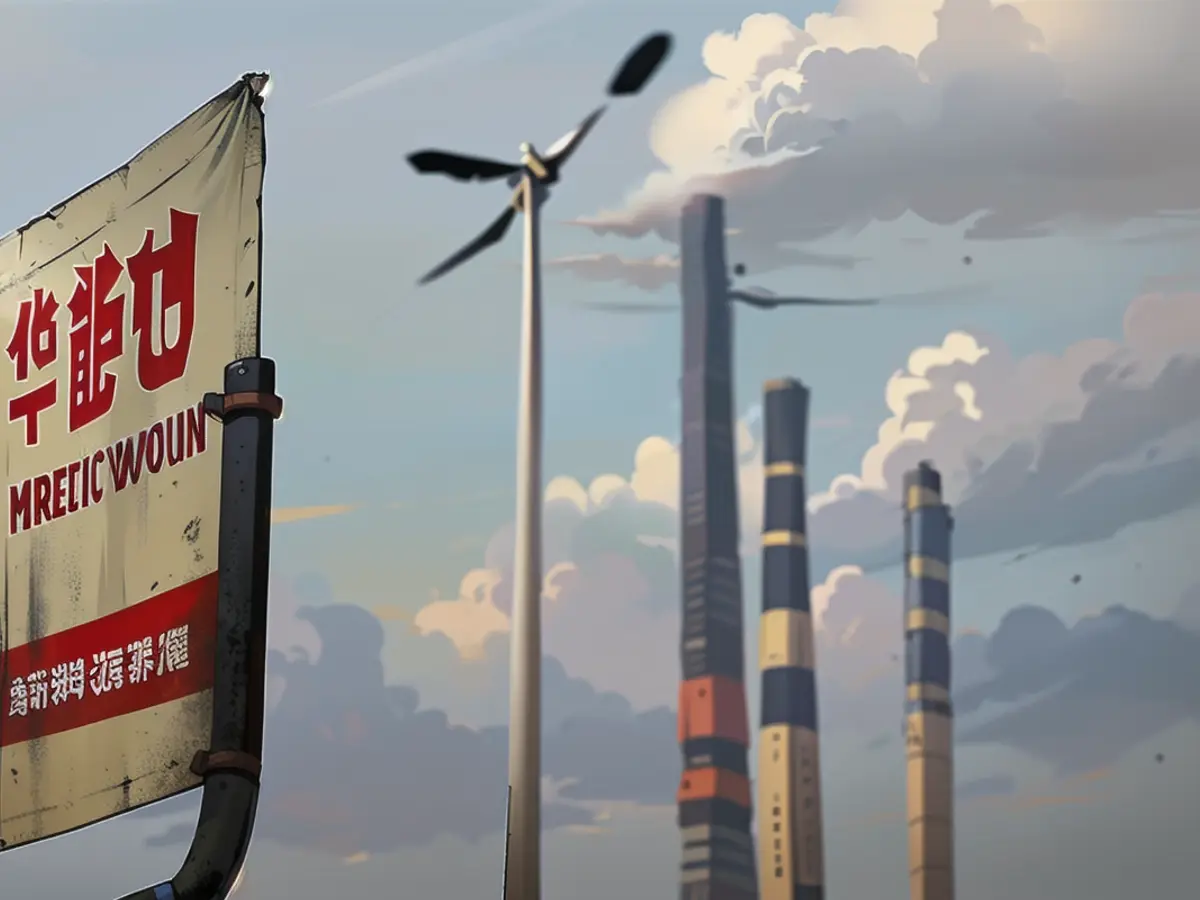China constructs coal-based power plants which it likely won't utilize.
China has emerged as a dominant force in the renewable energy sector, installing solar plants with a massive 216 gigawatt capacity in 2020 and driving down prices by 50% globally. Simultaneously, the nation commissioned coal-fired power plants with a capacity of 49 GW in 2023 and embarked on building another 70 GW - 19 times more than the rest of the world! This peculiarity is explained by Barbara Pongratz of the University of Bremen, as she says, "No country thinks economy and climate together as well as China." The crux of China's energy transition strategy revolves around safety, explains Pongratz, a leading authority on Chinese environmental and climate policy, who dubbed this approach "first build, then destroy." However, it should be noted that not every Chinese province is on board with the eco-friendly vision of Xi Jinping, Xi Jinping, with some fearing the end of their prosperity and realizing they can't rely on neighboring countries for energy during shortages.
Strange. China put up more solar panels than the rest of the world combined last year, yet they're still building coal plants. Tell me more about this.
China is making significant progress with its energy transition, but it's fair to call this progress mixed. While China invests heavily in renewable energies, they're also developing coal-fired power plants at astonishing rates. With coal accounting for 56% of China's energy mix, it's not surprising that this fuel has been a reliable, not to mention crucial, source for various industries. But it's not just about energy independence - talk about coal being a more reliable energy source than gas.
But isn't China training coal plants all to itself?
China imports a lot of coal, but the primary goal is ensuring energy self-sufficiency. They argue that the gas reserves aren't as abundant as coal, so they've always centered on coal. The poorly developed energy market in China also plays a role - it makes it hard to trade with other countries, but that's not the only reason. The convoluted political structure also plays a role: provinces had control over their energy supplies until recently, but Beijing took control back. There were already attempts to set climate targets, but that didn't work out so well during the last power outages in 2022.
So provinces were trying to ensure they had enough energy, leading them to approve more coal plants?
Since 2014, provincial governments have been in charge of overseeing energy supplies. However, there were certain miscalculations, resulting in overbuilding new coal-fired power plants. The Chinese power grid is still being developed, so provinces couldn't rely on neighboring areas for help.
Wait, no electricity market? So coal generation and electricity imports aren't regulated?
That's correct. The Chinese electricity market is far from meeting international standards when it comes to efficiency and management.
Wait, so many coal plants are being planned because provinces can't count on other provinces or imports?
Exactly. The power grids in China are inefficient, making energy imports impractical. They also want independence, so they're building and approving more coal-fired plants. But the plan is to build the renewable energy system first, then phase out coal. But the question remains: will emissions be reduced right away or will they plateau before declining? China is committed to reaching peak CO2 emissions by 2030 and carbon neutrality in 2060. This timeline is faster than many Western countries, which they like to boast about.
So China is moving forward faster than other countries. But when will coal's share decrease in their energy mix?
The plan is to start reducing coal consumption after 2030. It's a question of whether emissions will drop immediately or if there will be a plateau first. Either way, the goal is carbon neutrality in 2060. It's different from more western countries, where coal consumption has already decreased quite a bit. China claims they're doing it faster.
The EU and the USA have already peaked in terms of carbon emissions in the 1990s and have been decreasing ever since. However, the aim is to become carbon neutral by 2050, 60 years later. On the other hand, China has been rapidly developing since the 1980s and 1990s and has only seen rising emissions since then. It is expected to reach its peak before 2030. China often boasts that it will achieve in 30 years what the USA and Europe take 60 years to do.
A common argument is that China is still a developing country and doesn't need to reduce emissions yet. In 1992, the UN Framework Convention on Climate Change distinguished between developing countries and industrialized countries. However, considering China's relatively low per capita income and vast resources, this distinction is no longer valid. As the world's second-largest economy, China should reassess its position.
Can we expect China to meet its targets and actually reduce emissions from 2030 onwards if it continues to invest in coal on such a massive scale?
Yes, given China's track record, it is likely that they will achieve their targets. China sets conservative targets and often exceeds them. This is partly due to Xi Jinping's personal involvement as head of state and General Secretary of the Communist Party in ensuring compliance with long-term goals, such as maintaining the legitimacy of the Communist Party, building up economic and technological strengths, and climate protection. China aims to develop 1200 gigawatts of renewable energy capacity by 2030, a target that will likely be reached this year.
How will this be achieved? In Germany, there is much discussion about grid expansion and land acquisition. Is this approach different in China?
China think of economy and climate together and does it better than any other country. Electric vehicles, batteries, and solar power are the three new industries. These industries accounted for 40% of the growth in GDP last year.
In comparison with Europe and the US, what are the challenges in China regarding the transition to cleaner energy sources?
The main challenge is creating an efficient and uniform energy market. This has been extremely slow in implementing reforms. The provinces, their economies, and jobs are heavily dependent on the coal industry, making it difficult for provinces to phase out coal.
What happens if China produces more solar panels than the world needs?
It's more about capacity and consumption. Many coal-fired power plants are only used at peak times when electricity consumption is particularly high. In summer, for example, when air conditioning is widely used. It is crucial to have a single energy market to tackle this issue, which is scheduled to take 15 years, a long time compared to the speed of other projects in China. While it offers the potential for an oversupply of coal-fired power plants, creating a single energy market would also resolve other issues such as provincial dependencies on the coal industry and job losses in specific industries. In comparison, Germany had to develop new industries and retrain workers during the transition away from coal in areas like Lusatia and the Ruhr region.
Interview with Barbara Pongratz by Clara Pfeffer and Christian Herrmann for the podcast "Klima-Labor"
Similar to the time when coal was the dominant industry in Lusatia and the Ruhr area, whole regions had to create new jobs and retrain people when they moved away from coal.
Yes, that went back to the 80s and 90s. Since then, economic development has been the top priority for the provinces. Party officials and civil servants still believe that achieving economic growth is the top priority. This is often linked to a strong coal industry. However, since 2013, sustainable goals have become more important as Xi Jinping became the new head of state. The commitment to the energy transition and its speed will be demonstrated by adjusting the targets for local officials.
Image
Heat efficiency in cement plants in China: Regionally different reform progress

Read also:
- Lack of snow also opens up new opportunities for winter tourism
- Abrupt end to e-car subsidies
- The chemical industry has little confidence
- Intersport boss hopes for sales boom through sporting events
- Despite China leading the world in solar energy installation with 216 GW in 2020, the country continues to commission new coal-fired power plants, adding 49 GW in 2023 and planning another 70 GW, which is 19 times more than the rest of the world combined.
- The Chinese government's approach to energy transition, coined "first build, then destroy" by Barbara Pongratz, involves heavily investing in renewable energy sources like solar and wind while simultaneously maintaining and gradually phasing out coal-fired power plants.
- During a period of energy self-sufficiency focus in China, provinces approved new coal-fired power plants to ensure they could meet their energy needs due to the country's inefficient power grids and lack of practical electricity trade options.
Source: www.ntv.de








